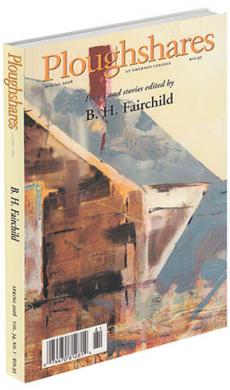rev of. National Anthem by Kevin Prufer
National Anthem, poems by Kevin Prufer (Four Way): Kevin Prufer’s terrific fourth collection exposes a nightmare straight from the head of Walt Whitman. In it, America sings a democratic song of distress, with no one, or thing, denied suffering or a voice: not the moon, nor minor politicians, shopping centers or the book’s most prevalent speaker, an ‘I’ without biography, who transcribes societal and environmental break-down via tropes suggestive of the post-apocalyptic scenarios of Mad Max and television’s "Jericho," of the conquer-n-collapse history of the Roman age.
A little dissociated, sometimes bemused, always hyper-vigilant, the speakers of these poems often sing in hauntingly soft rhyme, a harmony that belies the dissonances within psyches both national and personal, as in "The Moon is Burning:" "I have often looked across the fields, and the moon said, / You have only a short time, your kind. I paid it no mind. / Everything is always / talking. Dark moon, crescent, half, afire, / moon that skimmed the distant mountains / beyond which the Capitol slept, // moon that reddened them—and cast the city, I guessed, / in a lovely glow."
Like "The Wasteland’s" hysterical woman on a "burnished throne" and her distracted-by-dystopia partner, the you in "Those Who Could Not Flee" tries to engage a companion on edge over imminent destruction: "And you were saying, / Why shouldn’t we adopt? / A Chinese? A Romanian? A noble thing to do, these days, / and if the buildings burned / we wouldn’t see them through the weather // … A child from far away, a Russian / or a black one… // They’d burn the city / and the ones who couldn’t flee / they’d skin and nail to posts."
Prufer’s America is a country populated by clueless victims of fashion (foreign adoption as "thing to do") and hyper-aware victims of dread, with serious communication between them impossible. That the nameless partner would continue to muse on the "nobility" of bringing children of foreign birth to a country on the verge of violent invasion is its own fatal commentary.
Here, as in other poems in the book’s first section, the Roman Empire and the American one are inextricably conflated, the legions of Paulinas and "blue-faced" enemies inhabiting the same territory as the infamous Texas truck dragging case and the "they hate our freedoms" rationale for Islamo-terrorism. As in a contemporary Roman city, time in "National Anthem" exists in layers: a layered ‘now’ through which history reverberates, the past commingling with a dystopic present, empire collapsing, reconstituting and collapsing again in a loop of images by turns gorgeous, frightening and banal. In "What We Did With The Empire," two people do everything they can to be rid of it: hiding it in a sofa and leaving it "near the curb for students," burying it by a doghouse, even tying a barbell to it and throwing it over a bridge.
In the great "A History of the American West," the American West dreams on, a veritable Whitman sleeping "on an open raft…hat tipped forward…one hand limp…Gorgeous in his jeans and sunburnt arms, / gone / to the bomb blast and the gasp of time, / to Brigham Young and his wagonload of wives, / the heel and rein of men on horseback." Asleep to its reality of "fallout, cancer, birds trapped in the cloud," the Dust Bowl, even its own vulnerability, the American West "stall(s) in the brush…gone to everything but the gentle dream / in which the West rides westward" and the dream girls "who touch the horse’s sweat-damp coat, who stroke the shank, the saddle, / and his thigh—" and who then, suddenly, even voraciously, "haul him down."
The book’s second section is more intimate in scope, presenting the death of family and youth (girls, boys, the father) as a more personal analog to the empire collapse so vividly detailed in section one. Its strongest poems—"Girls in Heaven," "Cicada Shell," "Leukotomy"—display a wonderment of the surreal and the horrible that vivifies the entire book. But it’s "National Anthem’s" song of the imminent collapse of the American Empire that most thrilled and riveted this reader, and makes this book so memorable. —Dana Levin
Dana Levin’s most recent book of poetry is Wedding Day (Copper Canyon). A 2007 Guggenheim Fellow, she chairs the Creative Writing and Literature Department at College of Santa Fe.

